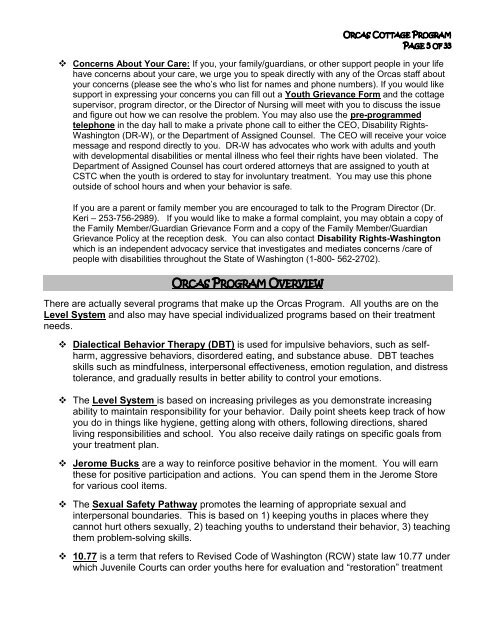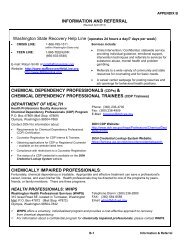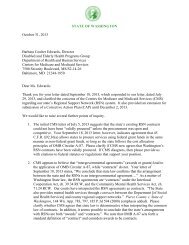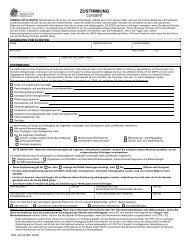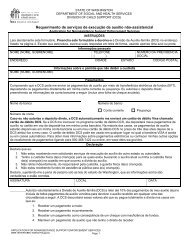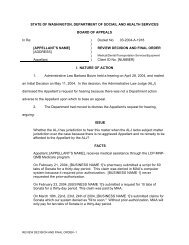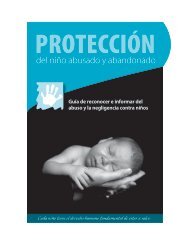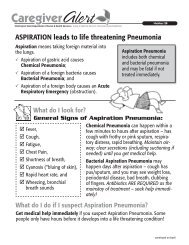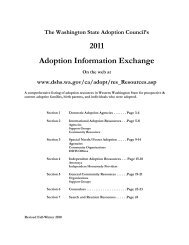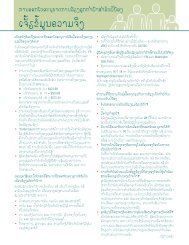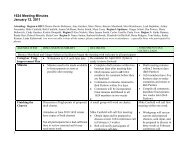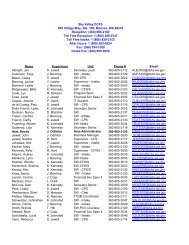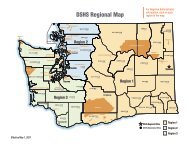Orcas Cottage Program - DSHS
Orcas Cottage Program - DSHS
Orcas Cottage Program - DSHS
Create successful ePaper yourself
Turn your PDF publications into a flip-book with our unique Google optimized e-Paper software.
ORCAS COTTAGE PROGRAM<br />
PAGE 5 OF 33<br />
Concerns About Your Care: If you, your family/guardians, or other support people in your life<br />
have concerns about your care, we urge you to speak directly with any of the <strong>Orcas</strong> staff about<br />
your concerns (please see the who’s who list for names and phone numbers). If you would like<br />
support in expressing your concerns you can fill out a Youth Grievance Form and the cottage<br />
supervisor, program director, or the Director of Nursing will meet with you to discuss the issue<br />
and figure out how we can resolve the problem. You may also use the pre-programmed<br />
telephone in the day hall to make a private phone call to either the CEO, Disability Rights-<br />
Washington (DR-W), or the Department of Assigned Counsel. The CEO will receive your voice<br />
message and respond directly to you. DR-W has advocates who work with adults and youth<br />
with developmental disabilities or mental illness who feel their rights have been violated. The<br />
Department of Assigned Counsel has court ordered attorneys that are assigned to youth at<br />
CSTC when the youth is ordered to stay for involuntary treatment. You may use this phone<br />
outside of school hours and when your behavior is safe.<br />
If you are a parent or family member you are encouraged to talk to the <strong>Program</strong> Director (Dr.<br />
Keri – 253-756-2989). If you would like to make a formal complaint, you may obtain a copy of<br />
the Family Member/Guardian Grievance Form and a copy of the Family Member/Guardian<br />
Grievance Policy at the reception desk. You can also contact Disability Rights-Washington<br />
which is an independent advocacy service that investigates and mediates concerns /care of<br />
people with disabilities throughout the State of Washington (1-800- 562-2702).<br />
ORCAS PROGRAM OVERVIEW<br />
There are actually several programs that make up the <strong>Orcas</strong> <strong>Program</strong>. All youths are on the<br />
Level System and also may have special individualized programs based on their treatment<br />
needs.<br />
Dialectical Behavior Therapy (DBT) is used for impulsive behaviors, such as selfharm,<br />
aggressive behaviors, disordered eating, and substance abuse. DBT teaches<br />
skills such as mindfulness, interpersonal effectiveness, emotion regulation, and distress<br />
tolerance, and gradually results in better ability to control your emotions.<br />
The Level System is based on increasing privileges as you demonstrate increasing<br />
ability to maintain responsibility for your behavior. Daily point sheets keep track of how<br />
you do in things like hygiene, getting along with others, following directions, shared<br />
living responsibilities and school. You also receive daily ratings on specific goals from<br />
your treatment plan.<br />
Jerome Bucks are a way to reinforce positive behavior in the moment. You will earn<br />
these for positive participation and actions. You can spend them in the Jerome Store<br />
for various cool items.<br />
The Sexual Safety Pathway promotes the learning of appropriate sexual and<br />
interpersonal boundaries. This is based on 1) keeping youths in places where they<br />
cannot hurt others sexually, 2) teaching youths to understand their behavior, 3) teaching<br />
them problem-solving skills.<br />
10.77 is a term that refers to Revised Code of Washington (RCW) state law 10.77 under<br />
which Juvenile Courts can order youths here for evaluation and “restoration” treatment


